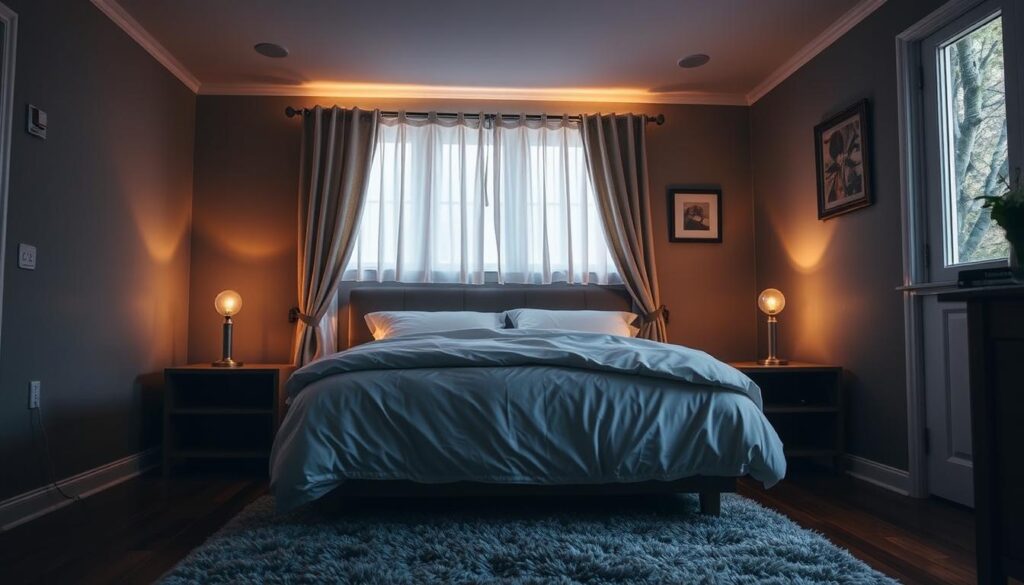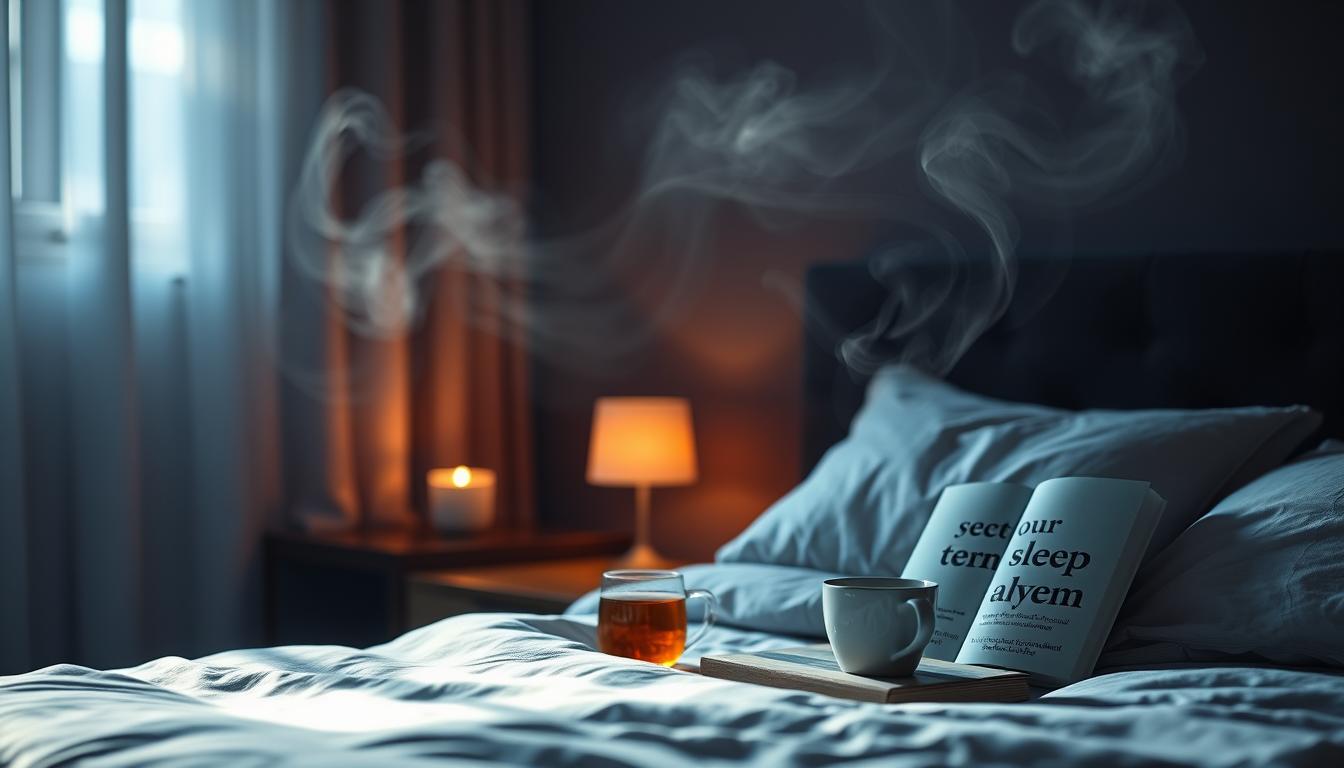how to get better sleep Best Remedies for Better Sleep
Getting a good night’s sleep is key for your health. Poor sleep can harm your thinking, mood, heart, and immune system. We’re here to help you find ways to sleep better.
We’ll share the best tips for better sleep. You’ll learn how to improve your sleep quality and create a sleep-friendly environment.
Many Americans face sleep disorders, affecting 50-70 million adults. It’s vital to find effective solutions. Start by learning how to sleep better and improve your sleep environment.
Our aim is to give you practical advice to enhance your sleep. This way, you’ll wake up feeling rested and refreshed.
Table of Contents
Understanding the Science Behind Quality Sleep
Exploring sleep is fascinating. Yet, many Americans don’t get enough sleep, leading to health problems. Experts say adults need at least seven hours of sleep each night. By adopting natural sleep habits and following sleep tips, you can sleep better.
Our bodies go through various stages while we sleep. These include REM and non-REM sleep. Adults usually spend half their sleep in Stage N2. Stage N3 and REM sleep are also important. Knowing these stages helps us value sleep and make better choices for better sleep.
Not getting enough sleep weakens our immune system. It makes us more likely to get sick. Long-term sleep loss also raises the risk of heart disease, diabetes, and high blood pressure. Healthy sleep habits https://naturalnicehealth.com/night-routine/and natural sleep methods can help avoid these risks and keep us healthy.

To sleep better, focus on sleep hygiene. This means creating a sleep-friendly environment and sticking to a sleep schedule. Doing this can make you feel refreshed and ready to go. Good sleep is key for our health, both physical and mental. By prioritizing sleep, we can live a healthier, balanced life.
Creating the Perfect Sleep Environment
To get better sleep, you need a sleep-friendly space. This means keeping your bedroom cool, quiet, and dark. The best temperature for sleep is about 65 degrees Fahrenheit. This helps your body relax and sleep easier.
Light from screens can mess with your sleep. So, turn off your devices and dim the lights at least 30 minutes before bed. This helps your body get ready for sleep.
Using techniques for deep restful sleep can really help. Keep your bedroom cool and quiet. You can also use heavy curtains to block out light. A comfy mattress and calming scents like lavender can make bedtime better.
Washing your sheets and vacuuming often can also help. These steps can make your bedroom a cozy place to sleep.

- Keep your bedroom tidy to avoid distractions
- Use soundproofing to block out outside noise
- Add plants like lavender and aloe vera to improve air and calmness
By following these tips, you can make your bedroom a great place to sleep. You’ll wake up feeling refreshed and ready for the day.
How to Get Better Sleep Through Daily Habits
Creating a daily routine can greatly improve your sleep quality. By adding healthy sleep habits to your day, you’ll wake up feeling great. A key tip is to stick to a sleep schedule and have a calming bedtime routine.
Effective sleep tips include avoiding caffeine and screens before bed. Try relaxing activities like a warm bath or reading a book to signal sleep time. Also, cut down on light and stimulating activities three hours before bed to help your body make melatonin.
Changing your daily habits can lead to lasting healthy sleep practices. Here are some important tips for better sleep:
- Stick to a wake-up time to keep your sleep patterns regular.
- Don’t take long naps after 3 p.m. to avoid sleep disruptions.
- Limit caffeine and alcohol, avoiding them close to bedtime.
- Exercise regularly, but not too close to bedtime.
Building new habits takes time and effort, but the benefits of better sleep are worth it. By focusing on sleep and making a few adjustments to your routine, you can wake up feeling refreshed and ready for the day.
Nutrition Strategies for Restful Sleep
What you eat affects your sleep quality. Adding natural sleep aids to your diet can make you feel more refreshed. A balanced diet helps regulate your sleep patterns.
Eating foods high in fiber, veggies, and lean proteins can help you sleep better. Tart cherry juice, kiwi, and salmon are good for sleep. But, too much caffeine, alcohol, and sugar can mess with your sleep. Being careful about what and when you eat can improve your sleep and health.
Some foods that can help with sleep include:
- Tart cherry juice
- Kiwi
- Oily fish like salmon
- Leafy green vegetables
- Nuts and seeds like pumpkin seeds
Avoid heavy meals before bed and limit caffeine and alcohol close to sleep time. Making smart diet choices can help you sleep better and wake up feeling good.
Adding sleep-promoting foods to your diet is important. But, good sleep hygiene is key too. This means having a regular sleep schedule, a calming bedtime routine, and avoiding screens before bed. A healthy diet and good sleep habits can make you wake up feeling rested.
Natural Remedies and Supplements for Sleep Enhancement
Many people look for techniques for deep restful sleep in natural remedies and supplements. Almost two-thirds of American adults have tried melatonin. Others use valerian root, magnesium, and L-Theanine. These can be good sleep improvement methods, but it’s important to use them right and know the side effects.
Valerian root, for example, can help you fall asleep and sleep better. Take 300 to 600 milligrams about an hour before bed. But, always follow the dosage and be careful mixing supplements with other drugs. The FDA doesn’t check these sleep aids for safety or how well they work.
Magnesium and glycine might also help you sleep better. But, magnesium can cause stomach problems at high doses. Glycine, on the other hand, has few side effects and works well even at small doses. Exploring these options can help you find better ways to sleep and improve your techniques for deep restful sleep.
Physical Activities That Improve Sleep Quality
Regular physical activity is a top way to better sleep. Adding healthy sleep habits to your day can make you feel more awake and refreshed. Try to do at least 30-45 minutes of movement daily, like walking, yoga, or aerobic exercises.
Some great activities for better sleep include:
- Yoga: poses like child’s pose and legs-up-the-wall can help sleep better
- Aerobic exercise: 20-30 minutes of moderate exercise daily can improve sleep
- Strength training: it can also make sleep better and longer
Also, relaxation techniques like deep breathing and progressive muscle relaxation are good for sleep. Adding these to your routine can make your sleep better and more refreshing.
Being active regularly can lead to better sleep and more of it. So, pick something fun and make it a daily habit. This way, you’ll start seeing better sleep quality soon.
Technology and Sleep: Finding the Right Balance
Finding a balance between technology and sleep is key. Tips for better sleep often suggest avoiding screens before bed. But, this can be hard in our digital world. The American Academy of Pediatrics says kids aged 2 to 12 should not use screens for more than an hour. Teens and adults should limit their screen time to under two hours a day.
To better your sleep, try these sleep improvement methods. Turn off devices one to two hours before bed. Or, use apps that block blue light or play calming music to help you relax.
Here are more tips to balance technology and sleep:
- Reduce screen time after dinner and avoid screens at bedtime
- Use devices with blue light filtering or apps that help you sleep
- Keep a regular sleep schedule and have a calming bedtime routine
By following these tips, you can improve your sleep and overall health. It’s a slow process, but it’s worth it. With time and effort, you can develop good sleep habits that will last a lifetime.
| Age Group | Recommended Screen Time |
|---|---|
| Children (2-12 years) | 1 hour per day |
| Teens and Adults | Under 2 hours per day |
Stress Management Techniques for Better Rest
Improving your sleep quality means tackling stress’s impact. About 70% of adults say stress hurts their sleep. To fight this, add stress management to your day. This can lead to better sleep and overall health.
Meditation methods calm your mind and body before bed. Journaling helps clear your mind, making sleep easier. Mix these with sleep tips for a better night’s rest.
Some key techniques for deep restful sleep include:
- Practicing relaxation techniques, such as yoga or meditation, to reduce stress and anxiety
- Engaging in regular physical activity to reduce stress levels and improve mood
- Maintaining a healthy diet and avoiding stimulating substances, such as caffeine and sugar, before bedtime
By adding these stress management techniques to your routine, you can sleep better. Wake up feeling refreshed and ready for the day.
Establishing a Consistent Sleep Schedule
To develop healthy sleep habits, it’s key to set a regular sleep schedule. Go to bed and wake up at the same time every day, even on weekends. This helps your body’s internal clock and improves sleep quality.
Creating a bedtime routine is another way to enhance sleep. It can be reading a book, taking a warm bath, or practicing relaxation techniques. These activities tell your brain it’s time to sleep.
To optimize your sleep environment, make sure your bedroom is dark, quiet, and cool. Morning light helps wake you up, while darkness boosts melatonin, making you sleepy. Also, avoid caffeine and electronics before bed to improve sleep quality.
Here are some tips for a consistent sleep schedule:
- Set a regular bedtime and wake-up time
- Gradually adjust your sleep schedule if needed
- Avoid napping close to bedtime
- Get some morning sunlight to help regulate your circadian rhythms
By following these tips and prioritizing healthy sleep habits, you can enhance your sleep and well-being. It might take time for your body to adjust, but with consistency and patience, you’ll see benefits in the long run.
Conclusion: Your Path to Restorative Sleep
Improving your sleep quality is a journey worth taking. By following the tips in this article, you can make your sleep better. This includes creating a great sleep environment and using natural remedies and stress management.
Good sleep is key to a healthy and productive life. It’s important to prioritize your health and well-being. Quality sleep is the foundation for a vibrant life.
Keeping a regular sleep schedule is essential. Going to bed and waking up at the same time every day helps a lot. People who do this feel 80% more refreshed in the morning.
Regular exercise also helps you sleep better. It makes falling asleep 50% faster. Morning light exposure can make you feel up to 30% more alert.
Keep working on your sleep habits. Find what works best for you, whether it’s a better bedroom or daily routines. Your journey to better sleep is unique. Be patient and enjoy the benefits of waking up feeling refreshed.
Source Links
- https://www.healthline.com/nutrition/17-tips-to-sleep-better – 15 Proven Tips to Sleep Better at Night
- https://www.hopkinsmedicine.org/health/wellness-and-prevention/sleep-aids – Sleep Aids
- https://www.webmd.com/women/natural-sleep-remedies – Natural Sleep Aids and Remedies
- https://www.sleepfoundation.org/how-sleep-works/why-do-we-need-sleep – Why Do We Need Sleep?
- https://pmc.ncbi.nlm.nih.gov/articles/PMC11221196/ – Exploring the Role of Circadian Rhythms in Sleep and Recovery: A Review Article
- https://www.healthline.com/health/healthy-sleep – All You Need to Know About Healthy Sleep
- https://www.sleepfoundation.org/bedroom-environment – Bedroom Environment: What Elements Are Important?
- https://www.calm.com/blog/best-sleep-environment – 6 tips you need to create the best sleep environment — Calm Blog
- https://sleepdoctor.com/sleep-environment – The Importance of Your Sleep Environment
- https://health.clevelandclinic.org/how-to-get-better-sleep – How To Get Better Sleep: Top Tips From a Sleep Specialist
- https://www.sleepapnea.org/sleep-health/sleep-hygiene/?srsltid=AfmBOop_Ew1GRAVkBe6n5otCS3ID6-hKjRvXKCTFzOzkywzsYJuAp0bM – Sleep Hygiene: Better Sleep Through Healthy Habits
- https://www.sleepfoundation.org/nutrition – Nutrition and Sleep: Diet’s Effect on Sleep
- https://www.sleepfoundation.org/nutrition/food-and-drink-promote-good-nights-sleep – The Best Foods To Help You Sleep
- https://www.sleepfoundation.org/sleep-aids/natural-sleep-aids – Natural Sleep Aids: Which Are the Most Effective?
- https://www.verywellhealth.com/natural-ways-to-help-you-sleep-88230 – 9 Natural Sleep Aids to Get Better Sleep
- https://thejacksonclinics.com/better-sleep/ – Move More, Sleep Better: How Exercise Enhances Your Sleep
- https://www.forbes.com/sites/jessepines/2025/03/04/effective-exercises-for-better-sleep/ – Effective Exercises for Better Sleep and Recovery
- https://www.calm.com/blog/exercise-for-sleep – Exercise for sleep: 8 best exercises to improve your sleep — Calm Blog
- https://goodnightsleepsite.com/2024/09/08/finding-the-balance-between-screen-time-and-sleep/ – Finding the Balance Between Screen Time and Sleep
- https://www.calm.com/blog/screen-time-before-bed – Does screen time before bed *actually* affect your sleep? — Calm Blog
- https://www.sleepjunkie.com/technology-and-sleep/ – Technology and Sleep: How Technology Affects Sleep in the Internet Age – Sleep Junkie
- https://www.webmd.com/sleep-disorders/tips-reduce-stress – Sleep Better with Less Stress
- https://www.helpguide.org/mental-health/stress/stress-management – Stress Management: Techniques to Deal with Stress
- https://www.piedmont.org/living-real-change/how-to-reduce-stress-and-anxiety-before-bedtime – How to reduce stress and anxiety before bedtime
- https://www.healthline.com/health/healthy-sleep/how-to-fix-sleep-schedule – Ways To Help You Change Your Sleep Routine
- https://health.clevelandclinic.org/how-to-fix-your-sleep-schedule – How To Fix Your Sleep Schedule
- https://www.healthline.com/health/sleep-hygiene – 12 Tips for Better Sleep Hygiene
- https://www.helpguide.org/wellness/sleep/getting-better-sleep – How to Sleep Better: Tips to Improve Sleep Quality
- https://www.everydayhealth.com/sleep-disorders/sleep/sleep-101-ultimate-guide-on-how-get-better-nights-sleep/ – Healthy Sleep: Why You Need Sleep, How Much You Need, and How to Get More

